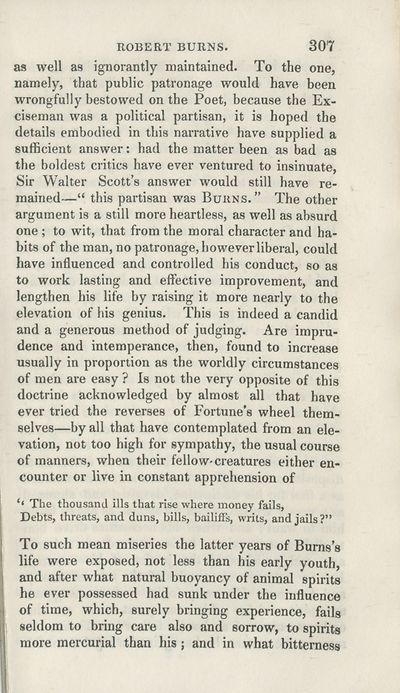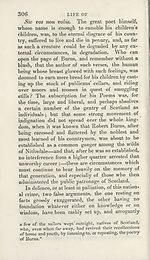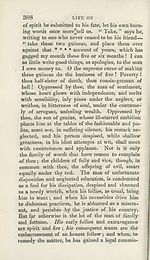Scotland/Scots > Life of Robert Burns
(317)
Download files
Complete book:
Individual page:
Thumbnail gallery: Grid view | List view

ROBERT BURNS. 307
as well as ignorantly maintained. To the one,
namely, that public patronage would have been
wrongfully bestowed on the Poet, because the Ex¬
ciseman was a political partisan, it is hoped the
details embodied in this narrative have supplied a
sufficient answer: had the matter been as bad as
the boldest critics have ever ventured to insinuate,
Sir Walter Scott’s answer would still have re¬
mained—“ this partisan was Burns.” The other
argument is a still more heartless, as well as absurd
one ; to wit, that from the moral character and ha¬
bits of the man, no patronage, however liberal, could
have influenced and controlled his conduct, so as
to work lasting and effective improvement, and
lengthen his life by raising it more nearly to the
elevation of his genius. This is indeed a candid
and a generous method of judging. Are impru¬
dence and intemperance, then, found to increase
usually in proportion as the worldly circumstances
of men are easy ? Is not the very opposite of this
doctrine acknowledged by almost all that have
ever tried the reverses of Fortune’s wheel them¬
selves—by all that have contemplated from an ele¬
vation, not too high for sympathy, the usual course
of manners, when their fellow-creatures either en¬
counter or live in constant apprehension of
‘‘ The thousand ills that rise where money fails,
Debts, threats, and duns, bills, bailiffs, writs, and jails?”
To such mean miseries the latter years of Burns’s
life were exposed, not less than his early youth,
and after what natural buoyancy of animal spirits
he ever possessed had sunk under the influence
of time, which, surely bringing experience, fails
seldom to bring care also and sorrow, to spirits
more mercurial than his ; and in what bitterness
as well as ignorantly maintained. To the one,
namely, that public patronage would have been
wrongfully bestowed on the Poet, because the Ex¬
ciseman was a political partisan, it is hoped the
details embodied in this narrative have supplied a
sufficient answer: had the matter been as bad as
the boldest critics have ever ventured to insinuate,
Sir Walter Scott’s answer would still have re¬
mained—“ this partisan was Burns.” The other
argument is a still more heartless, as well as absurd
one ; to wit, that from the moral character and ha¬
bits of the man, no patronage, however liberal, could
have influenced and controlled his conduct, so as
to work lasting and effective improvement, and
lengthen his life by raising it more nearly to the
elevation of his genius. This is indeed a candid
and a generous method of judging. Are impru¬
dence and intemperance, then, found to increase
usually in proportion as the worldly circumstances
of men are easy ? Is not the very opposite of this
doctrine acknowledged by almost all that have
ever tried the reverses of Fortune’s wheel them¬
selves—by all that have contemplated from an ele¬
vation, not too high for sympathy, the usual course
of manners, when their fellow-creatures either en¬
counter or live in constant apprehension of
‘‘ The thousand ills that rise where money fails,
Debts, threats, and duns, bills, bailiffs, writs, and jails?”
To such mean miseries the latter years of Burns’s
life were exposed, not less than his early youth,
and after what natural buoyancy of animal spirits
he ever possessed had sunk under the influence
of time, which, surely bringing experience, fails
seldom to bring care also and sorrow, to spirits
more mercurial than his ; and in what bitterness
Set display mode to:
![]() Universal Viewer |
Universal Viewer | ![]() Mirador |
Large image | Transcription
Mirador |
Large image | Transcription
| Antiquarian books of Scotland > Scotland/Scots > Life of Robert Burns > (317) |
|---|
| Permanent URL | https://digital.nls.uk/108249663 |
|---|
| Description | Thousands of printed books from the Antiquarian Books of Scotland collection which dates from 1641 to the 1980s. The collection consists of 14,800 books which were published in Scotland or have a Scottish connection, e.g. through the author, printer or owner. Subjects covered include sport, education, diseases, adventure, occupations, Jacobites, politics and religion. Among the 29 languages represented are English, Gaelic, Italian, French, Russian and Swedish. |
|---|

